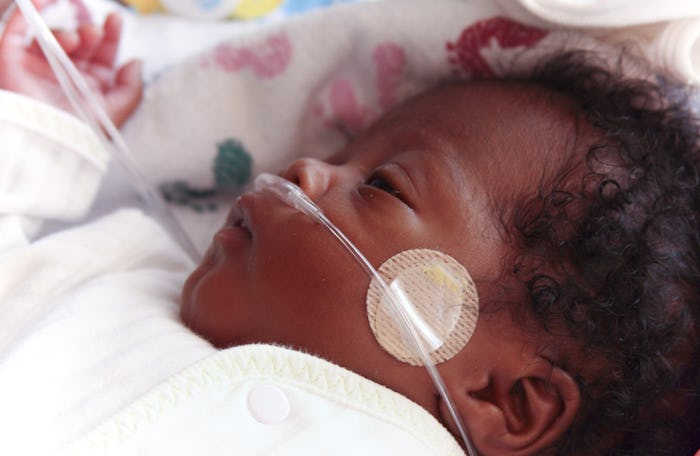All babies are miracles, but there is something special about a premature baby that makes me want to fist pump and cry at the same time. Watching a premature baby blossom into a happy, healthy kid is incredible. But there are still some problems premature babies may face later in life simply because of their early birthday.
According to the March of Dimes, a premature baby is categorized as any baby born before 37 weeks and, in the United States, these babies make up one out of every 10 born. Although a baby born at 36 weeks is considered premature, their health complications most likely differ from a baby born at 29 weeks — the Mayo Clinic noted that the earlier a baby is born, the higher the risk of complications.
The difficulties of a premature baby are obvious — they haven't had enough time to develop in the womb. So, according to the Mayo Clinic, they often have issues breathing on their own, low body temperature that they have trouble regulating, and a lack of sucking and/or swallowing reflexes, making it difficult to nurse or take a bottle.
But the complications don't end there. As they get older, a premature baby can become a happy, healthy child, but they could face these 11 problems later in life. Every child is different, so there's no guarantee that a premature baby will face some, if any, of these problems, but there is a chance because of their early bird due date. Depending on how early a premature baby was born, their risks could increase or decrease for each particular issue. If you're concerned, talk to your child's pediatrician about any risks and complications.
1Breathing Problems
According to the Mayo Clinic, your baby's lungs don't fully develop until the end of the third trimester. So a baby born too early can take on some breathing issues as they get older. The March of Dimes noted that asthma and bronchopulmonary dysplasia (BPD) are all possible conditions that can be caused by a premature birth. The latter, BPD, is a chronic lung disease that causes the lungs to grow abnormally or to be inflamed.
2Weaker Muscles
According to The Huffington Post, a Finnish study found that young adults who were born prematurely had weaker muscles than peers who were born at full-term. Those people born earlier than 37 weeks also reported that they did not feel as physically fit as their peers, despite the study not finding any evidence of that.
3More Social & School Struggles
Issues don't just affect a premature baby's health, they can also affect their social skills. A study from Rhode Island found that a premature baby was at risk of developing more social and school struggles later in life than their full-term peers. The March of Dimes noted similar issues, such as long-term intellectual and developmental disabilities like delays and/or issues with learning, communicating with others, and getting along with others.
4Heart Problems
Heart issues and premature babies often go hand-in-hand, but the complications can continue even as your baby becomes an adult. According to a study in Circulation, adults who were once premature babies are at risk of developing problems surrounding the heart such as cardiac risk factors like high blood pressure.
5Hearing Loss
A child may be born with hearing loss, but Baby Center noted that premature babies can develop hearing loss later on in life because of their low birth weight, abnormal inner ear development, or because of an infection that caused issues later in life.
6Intestinal Problems
A common issue in premature babies is necrotizing enterocolitis, a disease that can affect a premature baby's intestines according to the March of Dimes. Although most babies with this disease get better, the scarring and issues can affect them later in life by blocking their intestines and requiring surgery.
7Neurological Disorders
Time rounded up nine studies of premature babies and found in their review that one issue was prevalent in all of them — premature babies had an increased risk of developing neurological disorders later in life. According to the March of Dimes, many premature babies often grow up dealing with cerebral palsy.
8Behavioral & Psychological Problems
According to the Mayo Clinic, behavioral problems can be a complication for premature babies, including dealing with ADHD. Additionally, Time noted that premature babies are also at a greater risk of developing anxiety and even autistic features.
9Dental Issues
Parenting noted that enamel hypoplasia, a condition that leaves teeth lacking enamel protection and more prone to decay and staining, can affect preemies and even affect their adult teeth later in life. Without the enamel, a premature baby's adult teeth may be more prone to cavities and decay.
10Infections & Immune System Problems
It's no secret that premature babies are more prone to sickness, but that risk can carry on into adulthood. According to the Mayo Clinic, chronic health issues, infections, and underdeveloped immune systems can all affect a premature baby and leave them more susceptible to illnesses than if they had been born full-term.
11Vision Problems
The National Eye Institute noted that retinopathy of prematurity, an eye disorder that could potentially cause blindness, primarily affects premature babies. This condition doesn't affect them all, but it can potentially lead to serious vision problems or complete loss of eye sight.
